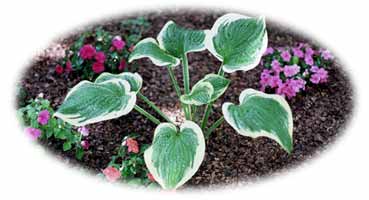Garden alert...
 Most
agility people are aware that as well as grapes and raisins, chocolate is poisonous to dogs.
However, you may not be aware that cocoa shells which are used as garden mulch contain enough
theobromine to kill dogs. Even if you don't have that much time to spend gardening
as you are going to shows every weekend, this page could save your dog's life.
Most
agility people are aware that as well as grapes and raisins, chocolate is poisonous to dogs.
However, you may not be aware that cocoa shells which are used as garden mulch contain enough
theobromine to kill dogs. Even if you don't have that much time to spend gardening
as you are going to shows every weekend, this page could save your dog's life.
A fairly recent arrival on the gardening market is cocoa mulch. It
is made from cocoa shells, a by-product of chocolate manufacturing. While this is an
attractive, ecologically sound option, it is potentially fatal to dogs. Vets have reported an
increasing number of deaths in dogs who really like to eat the cocoa mulch.
The mulch contains a significant quantity of theobromine, a
chemical relative to caffeine, and this is the same chemical that makes chocolate toxic to
dogs.
 There is a small
warning on the bag 'maybe harmful to animals' but not one that says it can be lethal to dogs.
Please make as many people aware of this as one dog's death is one too many.
There is a small
warning on the bag 'maybe harmful to animals' but not one that says it can be lethal to dogs.
Please make as many people aware of this as one dog's death is one too many.
Dr. Michael Knight of the Animal Poison Center in The States said
that all parts of the cocoa plant contain a compound called theobromine, a central nervous
system and cardiovascular stimulant. While there are no hard numbers on just how much of the
substance might be in a given batch of cocoa shell mulch, call your vet quickly if your dog is
symptoms consistent with theobromine poisoning - restlessness, panting, pacing, anxious
behaviour, call the vet quickly.
 Knight talked about
steps you can take to prevent your dogs from being poisoned in your own garden by by systemic
insecticides in granular form, incorporated into the soil at the base of perennial plants along
with organic fertilizing materials such as bone meal, fish meal, blood meal, feather meal or
manure. All of these organic materials are very attractive to dogs, who see them as a food
source.
Knight talked about
steps you can take to prevent your dogs from being poisoned in your own garden by by systemic
insecticides in granular form, incorporated into the soil at the base of perennial plants along
with organic fertilizing materials such as bone meal, fish meal, blood meal, feather meal or
manure. All of these organic materials are very attractive to dogs, who see them as a food
source.
- Don't use garden or lawn care chemicals in the
presence of your dogs.
- For your own and your dog's safety, read and follow
label directions carefully.
- Keep your dogs off a lawn or away from other plants
treated with an insecticide or a weed killer at least until the plants are completely dry.
- Keep your dogs out of an area where snail or slug bait
has been applied. Always store such products in areas inaccessible to your companion animals.
Contact the manufacturer for information concerning product usage around your pets.
Dr. Knight added that one needs to look at our homes through the
eyes of our pets, seeking out ‘toys' and ‘entertainments' that may be harmful for them. Be
prepared. If you suspect your dog has ingested something poisonous, seek medical attention
immediately.
If by some happy chance you're a dog-owner who hires a
professional landscaping service to care for your shrubs and other plants, be sure to get the
names of all insecticides and fertilizers the landscaper has used around your plants.
Sources: University of New Hampshire
web
site & UK Co-operative Extension Service of University of
Kentucky web site